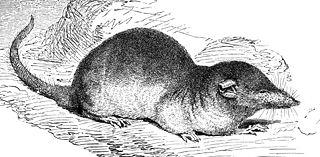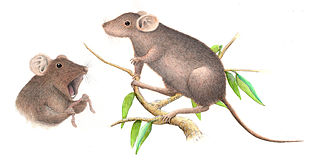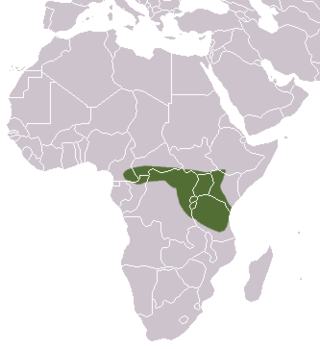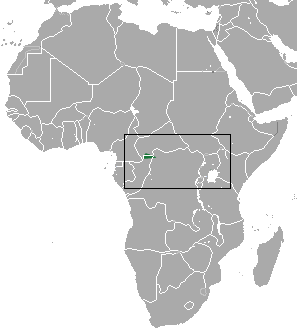
The white-toothed shrews or Crocidurinae are one of three subfamilies of the shrew family Soricidae.

The genus Crocidura is one of nine genera of the shrew subfamily Crocidurinae. Members of the genus are commonly called white-toothed shrews or musk shrews, although both also apply to all of the species in the subfamily. With over 180 species, Crocidura contains the most species of any mammal genus. The name Crocidura means "woolly tail", because the tail of Crocidura species are covered in short hairs interspersed with longer ones.

The large Mindoro forest mouse is a species of rodent in the family Muridae, from the genus Apomys. It is found only in the Philippines. Its natural habitat is subtropical or tropical moist montane forests. It is a large mouse with large feet, a long tail and an elongated snout which is morphologically unique within its genus. It is covered in soft fur which is mostly dark brown in colour. Its closest relative is thought to be the Luzon montane forest mouse, based on genetic and morphological similarities.

The dusky bushbaby is a species of primate in the family Galagidae. It is also known as Matschie's galago, in honour of the German zoologist Paul Matschie, curator of mammals at the Museum für Naturkunde in Berlin. Native to tropical Central Africa, it is found in forests in Burundi, Rwanda, Democratic Republic of the Congo and Uganda. The species is small with a long tail, and has an arboreal, nocturnal and omnivorous lifestyle.

The Asian gray shrew is a species of mammal in the family Soricidae. It is found in Bhutan, Cambodia, China, India, Laos, Malaysia, Myanmar, Nepal, Pakistan, the Philippines, Thailand, and Vietnam. It is one of the commonest species within its range and the International Union for Conservation of Nature has assessed its conservation status as being of "least concern".

Hildegarde's shrew is a species of mammal in the family Soricidae. It is found in Burundi, Cameroon, Central African Republic, Republic of the Congo, Democratic Republic of the Congo, Ethiopia, Kenya, Rwanda, and Tanzania. Considered by some authorities to be a subspecies of Crocidura gracilipes, it is now recognised as a separate species, with a diploid chromosome number of 2n = 52. This is one of three species of small mammal named by the British zoologist Oldfield Thomas in honour of anthropologist Hildegarde Beatrice Hinde.

Horsfield's shrew is a species of mammal in the family Soricidae found in Cambodia, China, India, Japan, Laos, Nepal, Bhutan, Sri Lanka, Taiwan, Thailand, and Vietnam.

The bicolored shrew or bicoloured white-toothed shrew is a species of mammal in the family Soricidae. It is found in eastern, central and southern Europe and in western Asia. It is a nocturnal species and feeds on insects and other small creatures. Several litters of young are born during the warmer months of the year in a nest of dry grasses in a concealed location.

The swamp musk shrew, or musk shrew, is a species of mammal in the family Soricidae. It occurs in Angola, Botswana, Democratic Republic of the Congo, Mozambique, Namibia, South Africa, Eswatini, Zambia and Zimbabwe. Its natural habitat is swamps, and it is a common species in suitable habitats, with the International Union for Conservation of Nature listing it as being of "least concern".

The Sri Lankan long-tailed shrew is a species of mammal in the family Soricidae. It is endemic to Sri Lanka. It is threatened by habitat loss.

The Ugandan musk shrew is a species of mammal in the family Soricidae. It is found in Uganda, the Democratic Republic of Congo and the Central African Republic. Its range, population size and habits are poorly known.

The African giant shrew is a species of white-toothed shrew. It also is known as, Mann's musk shrew, Euchareena's musk shrew, or Olivier's shrew. It is native to Africa, where it has a widespread distribution and occurs in many types of habitat. Its natural habitats are subtropical or tropical dry forest, subtropical or tropical moist lowland forest, subtropical or tropical moist montane forest, dry savanna, moist savanna, arable land, rural gardens, urban areas, and heavily degraded former forest. In the Nile Valley it is found near human habitation, where it is considered to be a pest. It is a common species and is listed by the International Union for Conservation of Nature as being of "least concern".

Whitaker's shrew is a species of mammal in the family Soricidae. It is found in Western Sahara, Algeria, Morocco, Tunisia. Its natural habitats are subtropical or tropical dry shrubland, rocky and sandy coasts. It is a fairly common species and the International Union for Conservation of Nature has rated its conservation status as being of "least concern".

Kihaule's mouse shrew is a species of mammal in the family Soricidae endemic to Tanzania where it is known only from the Udzungwa Mountains, at the western end of the Eastern Arc Mountains. Its natural habitats are subtropical or tropical moist montane forests and plantations. It is threatened by habitat destruction and the International Union for Conservation of Nature has assessed its conservation status as being "endangered". It was named after Philip M. Kihaule, a medical-entomological technician, who considerably contributed to the documenting of the small mammals of Tanzania and collected the type specimen of this shrew.

The long-tailed forest shrew, or long-tailed mouse shrew, is a species of mammal in the family Soricidae. It is endemic to South Africa, where its natural habitats are Mediterranean-type shrubby vegetation and swamps.

The white-legged duiker is a medium-sized antelope species from the subfamily of duikers (Cephalophinae) within the family of bovids (Bovidae). It is native to Gabon and the Republic of the Congo. It was described as subspecies of the Ogilby's duiker by Peter Grubb in 1978. After a revision of the ungulates in 2011 by Colin Groves, it is now regarded as distinct species.

The Batak shrew is a species of shrew from the Philippines.

Crocidura sapaensis is a species of white-toothed shrew native to northern Vietnam. It was first described in 2013 and its specific name derives from the Sa Pa where it was discovered.
The Sanetti shrew or Bekele's shrew is a species of mammal in the family Soricidae. It is endemic to Ethiopia.
Sokolov's shrew is a species of mammal in the family Soricidae. It is endemic to Vietnam.



















